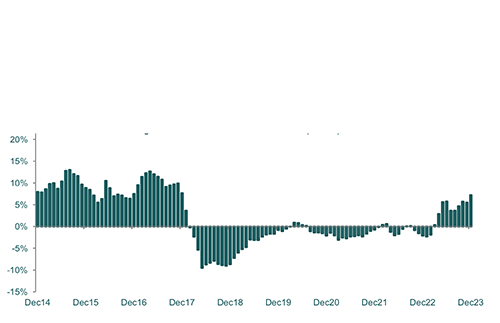<Staff Reporter
The upward trend in the FNB Rent Price Index continued for three consecutive quarters after moving out of a contractionary period from March 2023, reaching a 12-month average of 7.2% in Q4-2023 from 4.7% in Q3-2023 and -2.1% in Q4-2022.
This is the highest growth observed in the domestic rental market since 7.7%.
The average rent price on a 12-month rolling basis now stands at N$7 257.
When considering bedroom size, the three-bedroom segment recorded the highest growth at 19.1%, while the one-, two- and more than three-bedroom segments recorded muted growth of 0.6%, -0.3% and 0.0%, respectively.
Average rent prices are N$3 579, N$5 833, N$11 155 and N$21 294 for the one, two, three and more than three-bedroom segments, respectively.
The Index shows that the average deposit growth in Q4-2023 stood at 14.1% below the revised 15.3% in Q3-2023, whilst still above the 2.2% contraction in Q4-2022.
“We note that deposit growth has remained in double-digit territory since June 2023, which suggests that landlords are in a better position to charge higher deposits due to increased demand.
“We maintain our view that the dynamics in the rental market are not in line with what would be expected in a high price and elevated interest rate environment, which would weigh on affordability,” reads the Index compiled by FNB market research manager Mandisa van Wyk. The latest index continues to attribute the higher demand for rent to the fact that mortgages are unaffordable in the current high interest rate environment and consumers are opting to rent for longer, thereby enabling landlords to pass on higher rental prices and deposits with prospective tenants.
Moreover, the significant decline in house price transaction volumes (-19.1% in Q4-2023) corroborates this view.
Van Wyk noted these dynamics may explain why the resilience is mostly observed in the three-bedroom segment, rather than in the lower bedroom segments.
“We continue to monitor potential impacts from adjustments in the loan-to-value ratios, which became effective on 31 October 2023, which might incentivise investments in residential property, thereby increasing the supply of rental property. Also, the arrival of expats for oil and gas exploration activities could potentially be impacting the rental market,” the Index states.
Looking forward, the FNB team expects the rental market to continue a positive trajectory, as a slight uptick in inflation is expected due to the recent fuel hikes and global tensions.
This is as the repo rate remains at its peak of 7.75% with a high possibility the cutting cycle is pushed further beyond Q4-2024. Meanwhile, the rental market continues to surge upwards despite a weak consumer environment, remaining resilient during the last three quarters of 2023.
In the interim, inflation is expected to increase slightly in the coming quarters and interest rates are generally expected to have peaked in 2023, with the cutting cycle expected to begin in the latter part of 2024.
“We expect the rental market to increase slightly. The arrival of expats for oil and gas activities could potentially also be impacting the rental market. Furthermore, the decision by individuals to delay the purchasing of properties and rent for longer will continue to support the rental market,” Van Wyk stated.


